|
|
Help |
| Home - Computer - Internet (Books) | |
e99 Online Shopping Mall
|
|
Help |
| Home - Computer - Internet (Books) | |
| 1-20 of 99 | Next 20 |
click price to see details click image to enlarge click link to go to the store
| 1. The Shallows: What the Internet Is Doing to Our Brains by Nicholas Carr | |
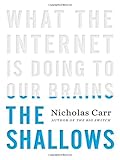 | Hardcover: 276
Pages
(2010-06-07)
list price: US$26.95 -- used & new: US$16.49 (price subject to change: see help) Asin: 0393072223 Average Customer Review: Canada | United Kingdom | Germany | France | Japan |
|
Editorial Review Product Description Customer Reviews (62)
| |
| 2. Internet Riches: The Simple Money-Making Secrets of Online Millionaires by Scott Fox | ||
 | Paperback: 304
Pages
(2008-03-25)
list price: US$17.95 -- used & new: US$10.37 (price subject to change: see help) Asin: 0814409954 Average Customer Review: Canada | United Kingdom | Germany | France | Japan | |
|
Editorial Review Product Description Customer Reviews (115)
| ||
| 3. The Internet For Dummies by John R. Levine, Margaret Levine Young | |
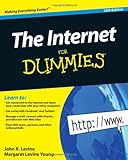 | Paperback: 432
Pages
(2010-01-19)
list price: US$24.99 -- used & new: US$8.09 (price subject to change: see help) Asin: 0470560959 Average Customer Review: Canada | United Kingdom | Germany | France | Japan |
|
Editorial Review Product Description Don't miss the 12th edition of this bestseller, fully updated and now covering social networking! Sixteen years since the publication of the first edition, this smash hit book has outsold and outlasted all the competition. See what all the excitement is about with the newest edition, The Internet For Dummies, 12th Edition. You'll not only find a lot of the basics presented in an easy-to-follow and friendly style, you'll also get the latest on social networking, security, and much more-stuff barely on the horizon a couple of years ago that now dominates the online landscape. Using the Internet? Get thoroughly up to speed with this popular guide. Customer Reviews (3)
| |
| 4. The Usborne Internet-Linked Encyclopedia Of World History by Jane Bingham, Fiona Chandler, Sam Taplin, Jane Chisholm | |
 | Hardcover: 416
Pages
(2001-01)
list price: US$39.99 -- used & new: US$26.39 (price subject to change: see help) Asin: 0746041683 Average Customer Review: Canada | United Kingdom | Germany | France | Japan |
|
Editorial Review Product Description Customer Reviews (34)
| |
| 5. The Victorian Internet: The Remarkable Story of the Telegraph and the Nineteenth Century's On-line Pioneers by Tom Standage | |
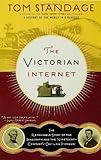 | Paperback: 256
Pages
(2007-09-18)
list price: US$15.95 -- used & new: US$4.99 (price subject to change: see help) Asin: 0802716040 Average Customer Review: Canada | United Kingdom | Germany | France | Japan |
|
Editorial Review Product Description Customer Reviews (58)
| |
| 6. How the Internet Works (8th Edition) by Preston Gralla | |
 | Paperback: 432
Pages
(2006-12-01)
list price: US$34.99 -- used & new: US$14.17 (price subject to change: see help) Asin: 0789736268 Average Customer Review: Canada | United Kingdom | Germany | France | Japan |
|
Editorial Review Product Description Simple, clear explanations walk you through every technology Detailed explanations walk you through the technology. The Internet has changed the world... and, with everything from blogs to podcasts, Internet phones to video, it’s still changing the world. Now, it’s easy to understand how it all works! This book’s big, brilliant, full-color illustrations and clear explanations make it all incredibly simple! DISCOVER HOW THE INTERNET REALLY WORKS... IT’S AMAZINGLY EASY! This new edition has been completely updated for today’s hottest Internet technologies, Web connections, hardware, communications and entertainment services, and much more! • See how the Internet can deliver any kind of information, anywhere: web pages, email, music, video, phone calls, and more! • Understand the most exciting new Internet technologies, from blogs and podcasting to wikis and BitTorrent • Discover how your connection to the Internet works... wireless, cable modem, DSL, even cellphones • Go behind the scenes with today’s most sophisticated websites, applications, and services • Protect yourself from the latest Internet dangers, including phishing, web surveillance, and wireless hacking Preston Gralla is the award-winning author of more than 30 books, including How the Internet Works, Complete Idiot’s Guide to Internet Privacy and Security, Complete Idiot’s Guide to Protecting Your Child Online, and How Wireless Works. He has written frequently about security issues, computer technology, the Internet, and has been a columnist for many magazines, websites and newspapers. Some of the explanations are weaker than others. While Gralla gives a lot of details about how Internet telephony works, his explanation of PointCast consists of, to paraphrase, "You install the special client software, which communicates with the special server software and presents news to you." It's more of a definition than an explanation. The book is split about evenly between simple definition entries and detailed, commendable how-it-works entries. There's no glossary per se, but the index is good. --David Wall Topics covered: Internet architecture, addressing, domain names, routers, connectivity, e-mail, newsgroups, Web browsers, push technologies, and Internet safety and security. Customer Reviews (35)
| |
| 7. The Future of the Internet--And How to Stop It by Jonathan Zittrain | |
 | Paperback: 352
Pages
(2009-03-17)
list price: US$17.00 -- used & new: US$8.00 (price subject to change: see help) Asin: 0300151241 Average Customer Review: Canada | United Kingdom | Germany | France | Japan |
|
Editorial Review Product Description This extraordinary book explains the engine that has catapulted the Internet from backwater to ubiquityand reveals that it is sputtering precisely because of its runaway success. With the unwitting help of its users, the generative Internet is on a path to a lockdown, ending its cycle of innovationand facilitating unsettling new kinds of control. IPods, iPhones, Xboxes, and TiVos represent the first wave of Internet-centered products that can’t be easily modified by anyone except their vendors or selected partners. These tethered appliances” have already been used in remarkable but little-known ways: car GPS systems have been reconfigured at the demand of law enforcement to eavesdrop on the occupants at all times, and digital video recorders have been ordered to self-destruct thanks to a lawsuit against the manufacturer thousands of miles away. New Web 2.0 platforms like Google mash-ups and Facebook are rightly toutedbut their applications can be similarly monitored and eliminated from a central source. As tethered appliances and applications eclipse the PC, the very nature of the Internetits generativity,” or innovative characteris at risk. The Internet’s current trajectory is one of lost opportunity. Its salvation, Zittrain argues, lies in the hands of its millions of users. Drawing on generative technologies like Wikipedia that have so far survived their own successes, this book shows how to develop new technologies and social structures that allow users to work creatively and collaboratively, participate in solutions, and become true netizens.” Customer Reviews (19)
| |
| 8. How I Made My First Million on the Internet and How You Can Too!: The Complete Insider's Guide to Making Millions with Your Internet Business by Ewen Chia | |
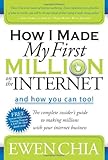 | Paperback: 354
Pages
(2009-01-01)
list price: US$18.95 -- used & new: US$11.97 (price subject to change: see help) Asin: 1600374700 Average Customer Review: Canada | United Kingdom | Germany | France | Japan |
|
Editorial Review Product Description Customer Reviews (52)
| |
| 9. Where Wizards Stay Up Late: The Origins Of The Internet by Katie Hafner | |
 | Paperback: 304
Pages
(1998-01-21)
list price: US$16.00 -- used & new: US$5.85 (price subject to change: see help) Asin: 0684832674 Average Customer Review: Canada | United Kingdom | Germany | France | Japan |
|
Editorial Review Product Description Twenty five years ago, it didn't exist. Today, twenty million people worldwide are surfing the Net.Where Wizards Stay Up Late is the exciting story of the pioneers responsible for creating the most talked about, most influential, and most far-reaching communications breakthrough since the invention of the telephone. In the 1960's, when computers where regarded as mere giant calculators, J.C.R. Licklider at MIT saw them as the ultimate communications devices. With Defense Department funds, he and a band of visionary computer whizzes began work on a nationwide, interlocking network of computers. Taking readers behind the scenes, Where Wizards Stay Up Late captures the hard work, genius, and happy accidents of their daring, stunningly successful venture. At last, Hafner and Lyon have written a well-researched story of theorigins of the Internet substantiated by extensive interviews with itscreators who delve into many interesting details such as thecontroversy surrounding the adoption of our now beloved "@"sign as the separator of usernames and machine addresses.Essentialreading for anyone interested in the past -- and the future -- of theNet specifically, and telecommunications generally. Customer Reviews (66)
| |
| 10. Internet Password Organizer by Innovention Lab | |
 | Spiral-bound: 122
Pages
(2007-11-21)
list price: US$19.99 -- used & new: US$19.99 (price subject to change: see help) Asin: 0615164706 Average Customer Review: Canada | United Kingdom | Germany | France | Japan |
|
Editorial Review Product Description Customer Reviews (23)
| |
| 11. The Extreme Searcher's Internet Handbook: A Guide for the Serious Searcher; Third Edition by Randolph Hock | |
 | Paperback: 352
Pages
(2010-02-08)
list price: US$24.95 -- used & new: US$12.47 (price subject to change: see help) Asin: 0910965846 Average Customer Review: Canada | United Kingdom | Germany | France | Japan |
|
Editorial Review Product Description Readers with little to moderate searching experience appreciate the author's helpful, easy-to-follow advice, while experienced searchers discover a wealth of new ideas, techniques, and resources. Those who train others to use the Internet find the book indispensable. As a reader bonus, the author maintains The Extreme Searcher s Web Page featuring links, updates, news, and much more. It's the ideal starting place for any Web search. Customer Reviews (11)
| |
| 12. Scalable Internet Architectures by Theo Schlossnagle | |
 | Paperback: 288
Pages
(2006-07-31)
list price: US$49.99 -- used & new: US$18.78 (price subject to change: see help) Asin: 067232699X Average Customer Review: Canada | United Kingdom | Germany | France | Japan |
|
Editorial Review Product Description As a developer, you are aware of the increasing concern amongst developers and site architects that websites be able to handle the vast number of visitors that flood the Internet on a daily basis. Scalable Internet Architecture addresses these concerns by teaching you both good and bad design methodologies for building new sites and how to scale existing websites to robust, high-availability websites. Primarily example-based, the book discusses major topics in web architectural design, presenting existing solutions and how they work. Technology budget tight? This book will work for you, too, as it introduces new and innovative concepts to solving traditionally expensive problems without a large technology budget. Using open source and proprietary examples, you will be engaged in best practice design methodologies for building new sites, as well as appropriately scaling both growing and shrinking sites. Website development help has arrived in the form of Scalable Internet Architecture. Customer Reviews (18)
| |
| 13. Who Controls the Internet?: Illusions of a Borderless World by Jack Goldsmith, Tim Wu | |
 | Paperback: 240
Pages
(2008-06-30)
list price: US$15.95 -- used & new: US$9.09 (price subject to change: see help) Asin: 0195340647 Average Customer Review: Canada | United Kingdom | Germany | France | Japan |
|
Editorial Review Product Description Customer Reviews (15)
| |
| 14. Internet & World Wide Web: How to Program (4th Edition) by Paul Deitel | |
 | Paperback: 1424
Pages
(2007-09-20)
list price: US$129.80 -- used & new: US$90.00 (price subject to change: see help) Asin: 0131752421 Average Customer Review: Canada | United Kingdom | Germany | France | Japan |
|
Editorial Review Product Description Internet and World Wide Web How to Program, 4e by market leading authors, Harvey M. Deitel and Paul J. Deitel introduces readers with little or no programming experience to the exciting world of Web-Based applications. This book has been substantially revised to reflect today's Web 2.0 rich Internet application-development methodologies. A comprehensive book that covers the fundamentals needed to program on the Internet, this book provides in-depth coverage of introductory programmming principles, various markup languages (XHTML, Dynamic HTML and XML), several scripting languages (JavaScript, PHP, Ruby/Ruby on Rails and Perl); AJAX, web services, Web Servers (IIS and Apache) and relational databases (MySQL/Apache Derby/Java DB) -- all the skills and tools needed to create dynamic Web-based applications. The book contains comprehensive introductions to ASP.NET 2.0 and JavaServer Faces (JSF) and a new chapter on Adobe Flex 2.0. Hundreds of live-code examples of real applications are throughout the book. The examples are downloadable from the Deitel website once registered and logged in and allow readers to run the applications and see and hear the outputs. The book provides instruction on building Ajax-enabled rich Internet applications that enhance the presentation of online content and give web applications the look and feel of desktop applications. The chapter on Web 2.0 and Internet business exposes readers to a wide range of other topics associated with Web 2.0 applications and businesses After mastering the material in this book, readers will be well prepared to build real-world, industrial strength, Web-based applications. For Internet and Web-based computer programmers, and others in organizations and businesses who need to develop their own Websites and pages. Customer Reviews (20)
| |
| 15. Internet, Mail, and Mixed-Mode Surveys: The Tailored Design Method by Don A. Dillman, Jolene D. Smyth, Leah Melani Christian | |
 | Hardcover: 512
Pages
(2008-10-12)
-- used & new: US$56.47 (price subject to change: see help) Asin: 0471698687 Average Customer Review: Canada | United Kingdom | Germany | France | Japan |
|
Editorial Review Product Description Customer Reviews (16)
| |
| 16. The Internet is a Playground by David Thorne | |
 | Paperback: 226
Pages
(2009-12-01)
list price: US$19.99 -- used & new: US$17.99 (price subject to change: see help) Asin: 0980672929 Average Customer Review: Canada | United Kingdom | Germany | France | Japan |
|
Editorial Review Product Description Customer Reviews (3)
| |
| 17. A Smart Girl's Guide to the Internet: How to Connect with friends, find what you need, and stay safe online (American Girl Library) by Sharon Cindrich, Ali Douglass | |
 | Paperback: 96
Pages
(2009-09-01)
list price: US$9.95 -- used & new: US$5.47 (price subject to change: see help) Asin: 1593695993 Average Customer Review: Canada | United Kingdom | Germany | France | Japan |
|
Editorial Review Product Description Customer Reviews (6)
| |
| 18. Internet Architecture and Innovation by Barbara van Schewick | |
 | Hardcover: 560
Pages
(2010-07-30)
list price: US$45.00 -- used & new: US$37.07 (price subject to change: see help) Asin: 0262013975 Average Customer Review: Canada | United Kingdom | Germany | France | Japan |
|
Editorial Review Product Description Customer Reviews (3)
| |
| 19. Internet Marketing From The Real Experts | |
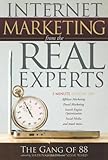 | Paperback: 346
Pages
(2010-01-31)
list price: US$21.95 -- used & new: US$12.86 (price subject to change: see help) Asin: 1600377440 Average Customer Review: Canada | United Kingdom | Germany | France | Japan |
|
Editorial Review Product Description What do Tim Carter, Brian Clark, Joel Comm, Jim Kukral, Ted Murphy, Jeremy Schoemaker, and Mari Smith have in common? They all walk the walk when it comes to their Internet marketing expertise. And they also have joined a couple dozen innovators and thought shapers to share their ideas, advice, and insight. Customer Reviews (20)
| |
| 20. Moonlighting on the Internet: 5 World-Class Experts Reveal Proven Ways to Make Extra Cash by Yanik Silver | |
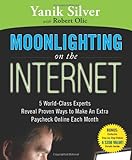 | Paperback: 288
Pages
(2007-11-21)
list price: US$21.95 -- used & new: US$8.75 (price subject to change: see help) Asin: 1599181576 Average Customer Review: Canada | United Kingdom | Germany | France | Japan |
|
Editorial Review Product Description Turn the Internet Into Your Money Machine “Well-written, practical, useful, money-earning advice for anyone interested in using the internet to create an extra $500 to $5,000 a month. Yanik Silver, one of the internet's truly remarkable success stories, holds nothing back. Instead of lots of meaningless claptrap contained in most books about the internet, the author shares the inside secrets of what really works. And what doesn't.”-Ted Nicholas, author of Billion Dollar Marketing Secrets “Moonlighting Online is a breath of fresh air. Yanik Silver doesn't claim you'll become a millionaire online, but he can show you 5 effective and simple ways to pull in a lot more money than you're earning now-and do it month after month. This is brilliant advice from a true professional. I strongly recommend this book.”-Joseph Sugarman, chairman, BluBlocker Corporation “Forget all the hype and B.S. you see about making money on the internet-Yanik Silver has truly provided the easiest and most down-to-earth ways of legitimately socking away a little (or a lot of) extra 'life-changing' money each month online.”-Robert Scheinfeld, New York Times bestselling author of Busting Loose From The Money Game “Imagine waking up every morning and finding orders waiting for you in your email box.While you were sleeping, customers from around the world were sending you money.I've been doing just that for over 12 years and Yanik Silver shows you how you cando it, too. It's a thrill every day.” -Melvin Powers, author of How to Get Rich in Mail Order “If you want to get rich overnight, this isn't the book for you. If you want simple-to-use strategies for making an extra $500+ per month online with minimal effort, listen to Yanik. He is one of the few who truly knows how this works.”-Timothy Ferriss, New York Times bestselling author of The 4-Hour Workweek Customer Reviews (37)
| |
| 1-20 of 99 | Next 20 |